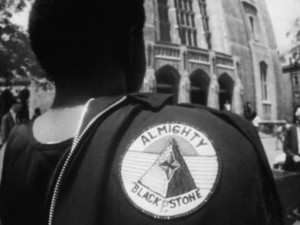By Maddie Corson
Lady Gaga may have been empowering her audience at the United Center on February 28th, but next door at the Chicago Public Library’s Manning branch, the authors of The Almighty Black P Stone Nation: The Rise, Fall and Resurgence of an American Gang (Lawrence Hill Books, 2011) were empowering an audience of their own. Co-authors Natalie Moore, a journalist for WBEZ radio, and Lance Williams, associate professor at Northeastern Illinois and son of a former gang member, spoke to a diverse room of students, couples, crying babies, and former gang members.
The Almighty Black P Stone Nation: The Rise, Fall and Resurgence of an American Gang addresses how the Black Stone Rangers, a prominent Chicago gang, came into existence and evolved since their founding in the late 1950s. The book’s objective is to give readers a holistic view of gangs and street life with an emphasis on three main themes: drugs, poverty and the war on terror. Modern media portrays gang members as monstrous, trigger-happy people. But were the Black Stone Rangers potential U.S. terrorists or civil rights activists? Moore and Williams leave it up to the reader to decide.

Williams read from a section of the book, revealing the unexpected role the Black Stones played in the civil rights movement, including acting as bodyguards to Dr. Martin Luther King, Jr. When a brick struck King, Jr. during one of his marches, the Black Stones were about to renounce King, Jr.’s peaceful ways. King, Jr. asked the Stones what one should do with a burning building.
“Do you throw more fire or water? Do you put fire out with fire?” the authors paraphrased King, Jr. “Water,” responded one of the agitated Stone members, as the authors described it, depicting a gang receiving an inspirational lesson from one of the most peaceful men in history. But did the Black Stones truly live by King, Jr.’s words?
Walking beside Dr. King, Jr. does not excuse extreme violence or let people forget that former members of the Black Stones and El Rukn gang founder Jeff Fort is in solitary confinement after being convicted of multiple federal charges. The Black Stone Rangers were accused of being part of a plot negotiating with Libya for money in exchange for committing an act of terrorism in the U.S. Fort was sentenced to a triple life sentence in a U.S. federal supermax prison.
It was startling sitting next to two former El Rukn members who spoke out on behalf of Fort, encouraging the audience to leave behind preconceived notions and to look deeper to see, they said, that Fort is not guilty. One of the men spoke eloquently and passionately, proclaiming that he would never want to see his country hurt and neither would Fort. This went on to spark other heated comments from audience members with diverse backgrounds.
Within the outspoken crowd was Joshua Dempsey, a first year college dropout who wore a University of Chicago sweatshirt. Although not in a gang, Dempsey knows and is aware of gang members. He claims that not all members are dangerous—some helped him with his math homework in high school, helped him to succeed, and continue to look after him. When asked how he stays out of gang life, he first and foremost attributes his gang-free lifestyle to his two strong male role models: his father and grandfather. He also owes it to himself, staying true to his priorities, and just “doin me.”
Buy the book and learn more about the gang at www.blackstonebook.com







